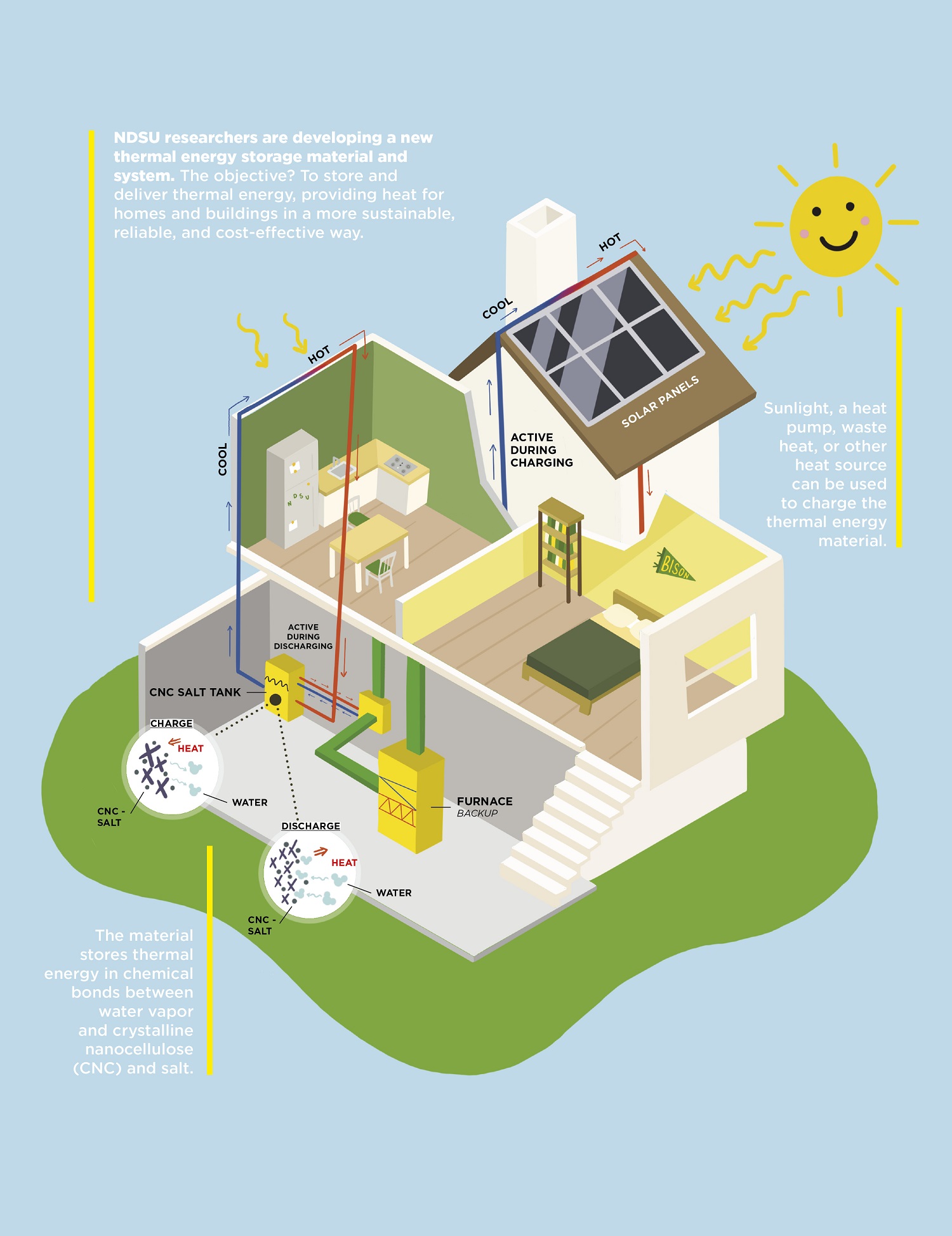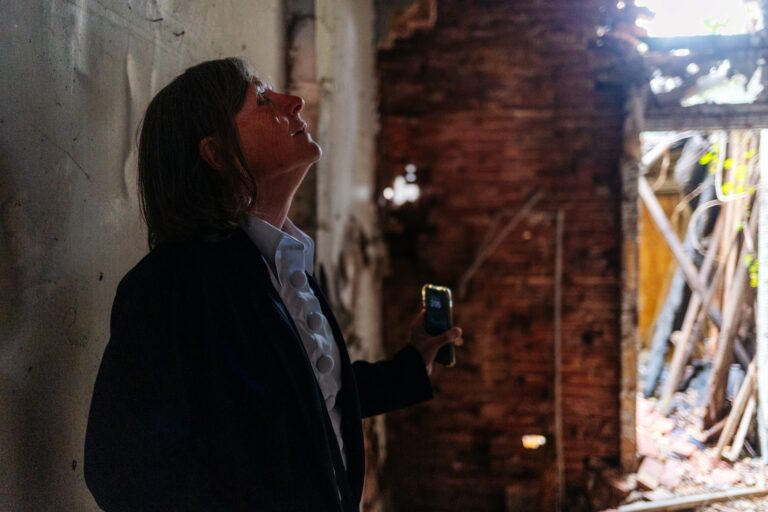Architect Kathleen Lechleiter ’81, ’82 is shaping safe, stable, and dignified housing in Baltimore neighborhoods.
Read MoreEnergized by an Oath
From homes that heat and cool themselves more efficiently to thermal systems that keep car batteries operating at an ideal temperature during the coldest North Dakota winters or hottest summer days, NDSU professor Adam Gladen is helping the College of Engineering become a national leader in energy stewardship.
Story by Kyle Bosch | Illustration by Leah Ecklund | August 28, 2023
I am an engineer. In my profession, I take deep pride. To it I owe solemn obligations.
Those three sentences, the opening lines of the Obligation of the Engineer, can be heard on campus every winter and spring when soon-to-be NDSU graduates join the Order of the Engineer.
The Order was formed in 1970 to foster a spirit of pride and responsibility in the engineering profession, but the idea of setting forth an ethical code can be traced back thousands of years to the Hippocratic oath.
At the core of the Obligation, and the Order itself, is the pledge of stewardship — an acknowledgment that the skills of an engineer come with an obligation to serve humanity by making the best use of the Earth’s precious resources.
“We all use energy every day; no one wants to go back to the Stone Age, and we, as people, have a responsibility to be good and wise stewards of the resources we have,” Adam Gladen, associate professor of mechanical engineering at NDSU, said. “Energy impacts our wallets, our environment, and our national security.”
Adam’s teaching and research are broadly focused on thermal energy systems, solar energy, thermal energy storage, and electrochemical systems. In the last two years, he has been awarded more than $2.24 million in research funding, including a major grant from the Department of Energy to develop a novel thermochemical adsorption material for thermal energy storage.

A breakthrough in this area could have major impacts on the amount of energy we use. Thermal energy needs for heating, cooling, and hot water make up 45% of total energy demand in commercial buildings and more than 60% in residential apartments and homes — by far the largest energy use.
“The [research] team is looking forward to developing this new material and modeling how it will improve energy usage in buildings,” Adam said. “Our long-term goal is to use this novel material in new storage systems to reduce energy usage in homes, offices, and other buildings. This can lead to significant savings for the owner, especially in states like North Dakota that have high heating loads. Eventually, we plan to use the results of the research to guide development of energy storage technology for other applications as well.
“None of these advancements would be possible without the hard work of our graduate students, undergraduate researchers, and campus collaborators,” Adam added. “Our student researchers at NDSU work very hard to move the research forward.”
Adam’s talent extends well beyond the research bench. In 2021, he was honored for his work in the classroom, earning the department of mechanical engineering’s Pi Tau Sigma Excellence in Teaching Award. Adam is also using what he learns in the lab to strengthen his classes and bring new offerings in high-demand areas like energy storage.
“I really see a strong tie between good teaching and good research. By being a better researcher, I can take those ideas and use them to strengthen my teaching in the classroom,” Adam said. “I can expose our students to areas they might not even think of as mechanical engineering or energy-related research and really deepen their understanding of how important it is and how meaningful and impactful it can be.”
Because of his success as a researcher and teacher, Adam was recently named the inaugural KFI Engineers Professor of Energy Stewardship. The position is funded by a $300,000 investment from KFI Engineers with the goal of building the NDSU College of Engineering into a national leader in energy stewardship by attracting and retaining top faculty.
We all use energy every day; no one wants to go back to the Stone Age, and we, as people, have a responsibility to be good and wise stewards of the resources we have.
– Adam Gladen
KFI Engineers is a 250-person process and infrastructure design firm with seven offices across the U.S. The company opened its Fargo office 10 years ago to gain access to a skilled and dedicated workforce that can be deployed nationally.
“NDSU’s College of Engineering, and its energy stewardship program, are gems,” Jim Faulconbridge ’90, professional engineer and co-founder of KFI Engineers, said. “It’s the best pathway for any kid from North Dakota, Minnesota, South Dakota, or wherever to earn an engineering degree, and anyone coming out of this program will be employable in any city in the United States, because those cities have infrastructure needs, both public and private, to support that workforce.”
Jim grew up in Mohall, North Dakota, and completed a pre-engineering program at Minot State University before transferring to NDSU. He credits his professors at NDSU, especially Sherman Goplen, for providing the tools to succeed.
“Dr. Goplen really set the table for us. He was passionate about undergraduate teaching and was very well respected for his industry experience. I didn’t really realize the quality of the faculty until I got out and listened to other people who did not have those same experiences at their schools,” Jim said.
As Jim himself can attest, quality faculty have a way of building connections with students that last a lifetime — and the best, like Sherman, have a way of continuing to teach lessons on stewardship even long after a degree is earned.
“Dr. Goplen is a tireless supporter of NDSU’s engineering program. He has his own scholarship to bring people into this program, so I think that is a good model to emulate,” Jim said.
Stewardship is about more than just the management of Earth’s resources. The concept of stewardship can be applied to many areas, including philanthropic support to the University. Every day, NDSU alumni are answering the call to care for a place that impacted their lives in countless ways and are using their time, talent, and treasures to propel NDSU to new heights.
By investing in our energy stewardship initiative, we’ll be able to build a national reputation in this area and develop new courses and labs that will enhance our educational offerings and give our students the skills companies need.
– Alan Kallmeyer
As the interim dean of the College of Engineering, Alan Kallmeyer is keenly aware of the finite nature of many resources within a university setting. Alan has worked closely with Jim to maximize the impact of KFI’s philanthropic investment. In addition to providing funding for Adam’s research, the department has also hired a new professor of practice specializing in thermal fluid sciences and energy stewardship.
Professors of practice focus on undergraduate teaching and bring important industry experience to provide students with real-world examples of the theory taught in class.
“Jim knows the value of strong faculty providing our students a great experience,” Alan said. “By investing in our energy stewardship initiative, we’ll be able to build a national reputation in this area and develop new courses and labs that will enhance our educational offerings and give our students the skills companies need.”
The push to create the energy stewardship program is part of a larger effort in the College of Engineering to grow teaching and research in areas of high economic importance to the state, region, and world. Other high-impact growth areas include precision agriculture and autonomous systems, artificial intelligence and cybersecurity, advanced infrastructure, and entrepreneurship and commercialization of new technology.
The hope is that KFI’s investment to kickstart the energy stewardship program will serve as a model for others, spurring more investment in the College of Engineering and NDSU. For Adam, it will serve as another way to live out the Obligation’s call to stewardship: wisely using the resources he has been given to help preserve Earth’s resources for generations to come while teaching new generations of NDSU engineers to do the same.
Share This Story
Related Stories
Structures of Connection
Joanna Slominski ’04 wants us to think differently about construction — it’s more than bricks and concrete.
Read More
